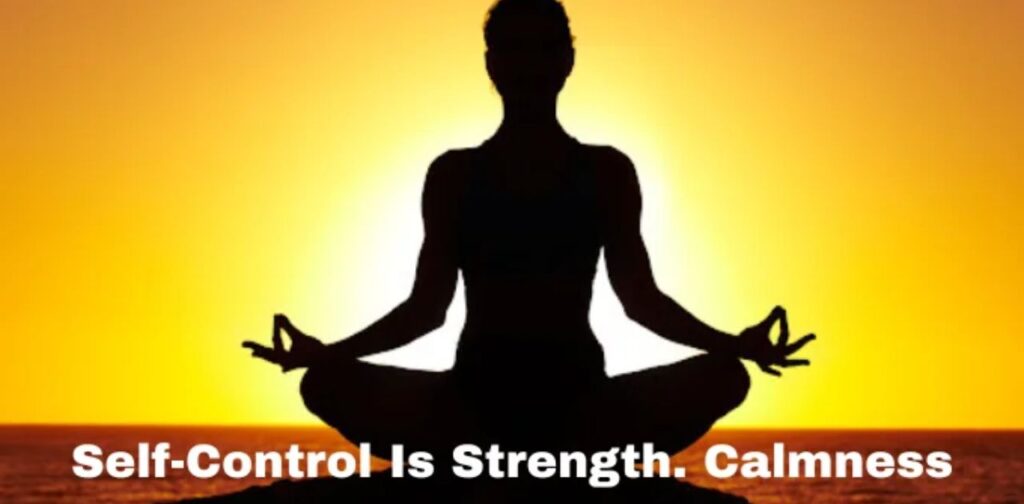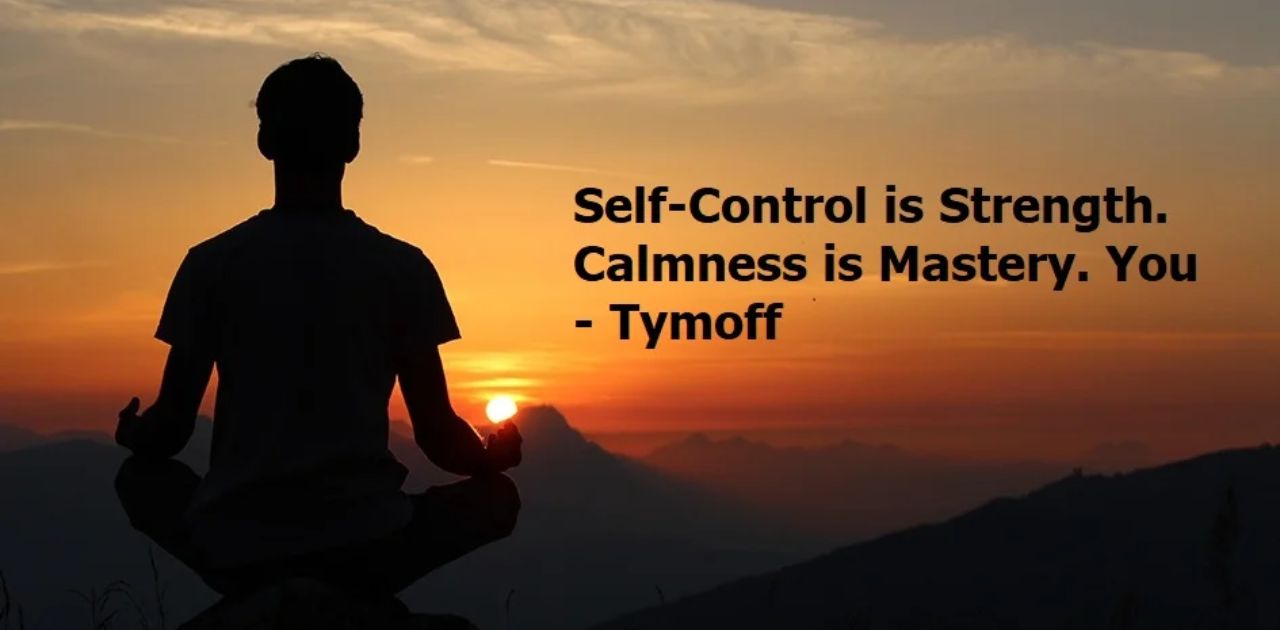In a world often marked by chaos and impulsiveness, the words “Self-Control Is Strength. Calmness Is Mastery. You – Tymoff” resonate with timeless wisdom. This powerful statement, attributed to the philosopher Tymoff, encapsulates the essence of inner strength and the art of mastering life’s challenges with grace.
By cultivating self-control and calmness, individuals can navigate the complexities of life with resilience and poise, ultimately shaping their own destinies and contributing to a more harmonious world.
Introduction to Self-Control
Self-control is often regarded as a cornerstone of personal strength and discipline. In the fast-paced modern world, where instant gratification is easily accessible, the ability to regulate one’s actions, thoughts, and emotions has become a critical skill. Self-control, at its core, is the power to resist impulses, delay gratification, and make choices that align with long-term goals and values. This capacity is not merely a trait but a profound source of inner strength that fortifies the human spirit against life’s challenges.
The Psychological Foundations of Self-Control
Psychologically, self-control is linked to the executive functions of the brain, particularly in the prefrontal cortex, which governs decision-making, behavior regulation, and goal-oriented activities. The development of self-control starts in childhood, and it plays a significant role in shaping an individual’s character and life trajectory. Studies have shown that individuals with high self-control tend to have better academic performance, healthier relationships, and greater well-being.
Self-Control in Historical and Cultural Contexts
Across various cultures and historical contexts, self-control has been esteemed as a virtue. In ancient Greek philosophy, for instance, the concept of “sophrosyne” encapsulated self-control as a form of moderation and balance, essential for achieving eudaimonia or flourishing. Similarly, in Eastern traditions like Buddhism and Confucianism, self-control is considered vital for cultivating inner peace and moral integrity.
Self-Control as a Daily Practice
Practicing self-control in daily life involves making conscious choices that prioritize long-term benefits over short-term pleasures. This could mean resisting the urge to procrastinate, choosing healthy food over junk, or maintaining composure in stressful situations. Each of these decisions, though small, contributes to building the “muscle” of self-control, which becomes stronger with consistent practice.
The Challenges to Self-Control
Despite its importance, self-control is often challenged by various internal and external factors. Stress, fatigue, and social pressures can weaken one’s resolve, leading to impulsive decisions. Recognizing these challenges and developing strategies to overcome them, such as mindfulness practices or setting clear goals, is crucial for maintaining self-control.
The Rewards of Self-Control
The rewards of cultivating self-control are manifold. It leads to improved mental and physical health, better relationships, and a greater sense of accomplishment. Moreover, self-control is closely linked to self-respect and dignity, as it allows individuals to live in accordance with their values and aspirations.
Calmness: The Brushstroke of Mastery
Calmness is often perceived as a state of inner peace and tranquility, but it is much more than mere serenity. Calmness, especially in the context of personal mastery, is the ability to maintain composure and clear-headedness in the face of challenges. It is an active state of control over one’s emotional responses, allowing for thoughtful and deliberate action rather than reaction.
The Role of Calmness in Emotional Intelligence
Calmness is a key component of emotional intelligence, which is the ability to recognize, understand, and manage our own emotions, as well as the emotions of others. Individuals who possess calmness are better equipped to handle stress, resolve conflicts, and communicate effectively, making it a critical skill in both personal and professional contexts.
Calmness in Philosophy and Spirituality
In many philosophical and spiritual traditions, calmness is seen as a sign of wisdom and maturity. Stoic philosophers like Marcus Aurelius advocated for maintaining calmness in all situations, viewing it as essential for rational thought and ethical behavior. In Eastern philosophies, calmness is associated with detachment and mindfulness, enabling individuals to transcend the disturbances of daily life.
Cultivating Calmness: Techniques and Practices
Cultivating calmness requires regular practice and mindfulness. Techniques such as deep breathing, meditation, and yoga are effective in calming the mind and body. These practices help in grounding oneself, reducing stress, and enhancing the ability to stay calm under pressure.
The Impact of Calmness on Decision-Making
Calmness significantly influences decision-making. A calm mind is less likely to be swayed by emotions or external pressures, leading to more rational and thoughtful decisions. Whether in leadership, negotiations, or personal choices, calmness allows for a broader perspective and better judgment.
The Power of Calmness in Relationships
In relationships, calmness fosters a stable and nurturing environment. It enables individuals to listen actively, communicate clearly, and resolve conflicts amicably. A calm demeanor can also defuse tense situations and prevent misunderstandings, making it an invaluable trait for maintaining healthy and harmonious relationships.
Calmness as a Reflection of Inner Strength
Ultimately, calmness is a reflection of inner strength and resilience. It is not about suppressing emotions but about managing them in a way that aligns with one’s values and goals. This mastery of emotions not only enhances personal well-being but also inspires confidence and respect from others.
The Symbiosis of Self-Control and Calmness
Self-control and calmness are deeply interconnected, each reinforcing the other in the pursuit of personal mastery. While self-control provides the foundation for regulating impulses and maintaining discipline, calmness enhances the ability to apply self-control effectively, especially in high-stress situations.
Self-Control as a Prerequisite for Calmness
Self-control is often the precursor to calmness. When one can control their impulses and reactions, they create the mental space needed for calmness to flourish. Without self-control, calmness is easily disrupted by external stimuli and internal emotional turmoil.
Calmness as the Outcome of Self-Control
Conversely, calmness is the natural outcome of practiced self-control. When individuals consistently exercise self-control, they cultivate a state of inner peace that manifests as calmness. This calmness, in turn, reinforces their ability to maintain self-control, creating a positive feedback loop.
Case Studies: The Symbiosis in Action
Consider the example of a professional athlete who faces immense pressure during competitions. The athlete’s success depends not only on physical prowess but also on the ability to remain calm and composed under pressure. Here, self-control (in terms of maintaining focus and resisting distractions) directly contributes to calmness, which in turn enhances performance.
The Role of Self-Control and Calmness in Leadership
In leadership, the symbiosis of self-control and calmness is particularly important. Leaders who embody these traits are better equipped to make sound decisions, inspire confidence, and manage teams effectively. Their ability to stay calm and controlled in crises sets the tone for the entire organization, promoting a culture of stability and resilience.
Enhancing the Symbiosis through Practice
Strengthening the relationship between self-control and calmness requires regular practice and reflection. Mindfulness exercises, journaling, and meditation can help individuals become more aware of their impulses and emotions, allowing them to cultivate both self-control and calmness more effectively.
Challenges to the Symbiosis and How to Overcome Them
While the symbiosis of self-control and calmness is powerful, it is not without challenges. Stress, fatigue, and external pressures can disrupt this balance. Overcoming these challenges involves maintaining a healthy lifestyle, setting clear boundaries, and practicing self-care to ensure that both self-control and calmness remain strong.
“You – Tymoff”: The Empowerment of Individual Agency

The Significance of “You – Tymoff”
The phrase “You – Tymoff” serves as a reminder of the power of individual agency in the pursuit of self-mastery. It emphasizes that the journey toward strength and mastery is a personal one, where each individual holds the key to their growth and development.
Personal Responsibility and Empowerment
At the heart of Tymoff’s message is the idea of personal responsibility. It suggests that while external circumstances may influence one’s life, the true power lies in how individuals choose to respond. This empowerment stems from the understanding that self-control and calmness are within reach for everyone, provided they are willing to put in the effort.
Self-Discovery and Authenticity
“You – Tymoff” also underscores the importance of self-discovery and authenticity. It encourages individuals to embrace their unique path rather than conforming to societal expectations. In doing so, they can cultivate self-control and calmness in ways that are true to themselves, leading to genuine personal growth.
The Role of Self-Mastery in Personal Growth
Self-mastery is a continuous process that involves learning, reflection, and adaptation. By taking ownership of their journey, individuals can develop a deeper understanding of themselves, which in turn enhances their ability to practice self-control and calmness.
Overcoming External Influences
In a world where external influences are pervasive, maintaining individual agency requires conscious effort. Social media, peer pressure, and cultural norms can all challenge one’s sense of self. However, by grounding oneself in the principles of self-control and calmness, individuals can resist these pressures and stay true to their values.
The Empowerment of Choice
The essence of Tymoff’s message lies in the empowerment of choice. Every decision, whether big or small, is an opportunity to exercise self-control and maintain calmness. By making choices that align with their long-term goals, individuals can navigate life’s challenges with greater confidence and resilience.
Encouraging Others to Embrace Their Agency
Empowering oneself is only part of the journey. Encouraging others to embrace their agency is equally important. By leading by example and sharing experiences, individuals can inspire those around them to take control of their lives and pursue self-mastery.
Practical Application in Everyday Life
Integrating self-control and calmness into daily life requires intentional practice and consistency. Start by setting clear goals and priorities, which serve as a guide for making decisions that align with long-term objectives. This clarity reduces the likelihood of impulsive actions and enhances self-control.
Mindfulness and Meditation
Mindfulness and meditation are powerful tools for cultivating self-control and calmness. By regularly practicing mindfulness, individuals become more aware of their thoughts and emotions, allowing them to respond thoughtfully rather than react impulsively. Meditation, on the other hand, helps in grounding oneself, reducing stress, and fostering a sense of inner peace.
Setting Boundaries and Managing Stress
Effective self-control and calmness require the ability to set boundaries and manage stress. This might involve saying no to commitments that do not align with one’s goals, creating a healthy work-life balance, and ensuring adequate rest and relaxation. By managing stress, individuals can maintain their composure and make better decisions.
Developing a Routine
Developing a daily routine that incorporates practices like exercise, healthy eating, and sufficient sleep can significantly enhance self-control and calmness. Physical health and mental well-being are closely linked, and a healthy body supports a calm mind.
Practical Techniques for Emotional Regulation
Emotional regulation is a key aspect of self-control and calmness. Techniques such as deep breathing, progressive muscle relaxation, and cognitive reframing can help manage emotions in challenging situations. These practices enable individuals to stay calm and controlled, even when faced with stress or adversity.
The Role of Journaling
Journaling is a practical tool for reflecting on one’s experiences and progress in self-mastery. By regularly writing about thoughts, feelings, and challenges, individuals can gain insights into their patterns of behavior and develop strategies for improvement.
Applying Self-Control and Calmness in Social Interactions
In social interactions, self-control and calmness can be applied by actively listening, pausing before responding, and considering the perspective of others. These practices not only enhance personal relationships but also contribute to a more harmonious social environment.
Challenges in Practical Application
Applying these virtues in everyday life is not without challenges. Situations may arise where maintaining self-control and calmness is difficult, such as during conflicts, under pressure, or when faced with temptation. Recognizing these challenges and preparing strategies to deal with them, such as seeking support or taking time to cool off, is essential for consistent practice.
The Art of Response, Not Reaction
The distinction between response and reaction is crucial in the practice of self-control and calmness. A reaction is often immediate, driven by emotions and impulses, and may not always align with one’s values or long-term goals. A response, however, is deliberate and considered, reflecting a thoughtful engagement with the situation at hand.
Why Response is a Sign of Strength
Responding rather than reacting is a sign of strength because it demonstrates control over one’s emotions and actions. It shows that the individual is not easily swayed by external circumstances but instead makes decisions that are in line with their principles and objectives.
Practical Steps to Develop the Art of Response
Developing the art of response involves cultivating mindfulness and patience. Before reacting to a situation, take a moment to breathe, assess the circumstances, and consider the potential outcomes of different responses. This pause allows for a more measured and effective approach.
The Role of Empathy in Responding
Empathy plays a significant role in responding thoughtfully. By considering the feelings and perspectives of others, individuals can choose responses that are not only appropriate but also compassionate and constructive. This approach is particularly important in resolving conflicts and building strong relationships.
Responding in High-Stress Situations
In high-stress situations, the ability to respond rather than react can be particularly challenging. Techniques such as deep breathing, visualization, or even stepping away from the situation temporarily can help maintain composure and facilitate a thoughtful response.
Examples of Response in Leadership and Conflict Resolution
In leadership, responding rather than reacting is critical for effective decision-making and conflict resolution. A leader who responds with calmness and clarity in a crisis sets a positive example for their team, fostering an environment of trust and stability. Similarly, in conflict resolution, a thoughtful response can de-escalate tensions and lead to more constructive outcomes.
Challenges in Practicing the Art of Response
One of the main challenges in practicing the art of response is overcoming the natural tendency to react, especially in emotionally charged situations. Overcoming this requires self-awareness, patience, and a commitment to personal growth. Practicing mindfulness and reflection can help individuals develop the habit of responding thoughtfully.
Resilience in the Face of Adversity
Resilience is the ability to bounce back from adversity and maintain a positive outlook despite challenges. It is closely linked to self-control and calmness, as these virtues provide the foundation for enduring hardships with grace and determination.
Building Resilience through Self-Control
Self-control plays a critical role in building resilience. By managing impulses and maintaining focus on long-term goals, individuals can navigate difficulties without becoming overwhelmed. Self-control also helps in maintaining a sense of purpose and direction, which is essential for resilience.
The Role of Calmness in Resilience
Calmness contributes to resilience by providing a stable emotional foundation. In times of crisis, remaining calm allows individuals to assess situations clearly, make rational decisions, and maintain hope. This emotional stability is crucial for overcoming challenges and emerging stronger.
Resilience in Personal and Professional Life
Resilience is essential in both personal and professional life. In personal life, it helps individuals cope with loss, failure, and other life challenges. In professional life, resilience is key to managing stress, adapting to change, and achieving long-term success.
Strategies for Enhancing Resilience
Enhancing resilience involves developing a positive mindset, building strong social connections, and practicing self-care. Techniques such as cognitive reframing, where negative thoughts are challenged and replaced with more positive perspectives, can also be effective. Additionally, setting realistic goals and celebrating small victories can boost resilience.
The Role of Support Systems in Resilience
Support systems, including family, friends, and colleagues, play a vital role in resilience. Having a network of supportive relationships provides emotional comfort, practical assistance, and a sense of belonging, all of which contribute to resilience.
Resilience in the Context of Global Challenges
In the context of global challenges, such as economic downturns or pandemics, resilience becomes even more important. Individuals and communities that cultivate resilience are better equipped to adapt, recover, and thrive in the face of widespread adversity.
Overcoming Adversity with Self-Control and Calmness
Ultimately, overcoming adversity requires a combination of self-control and calmness. Self-control ensures that individuals stay focused on their goals and do not give in to despair, while calmness provides the emotional stability needed to navigate difficulties. Together, these virtues empower individuals to face challenges with courage and resilience.
Influence on Decision-Making
Self-control significantly impacts decision-making by allowing individuals to resist impulsive choices and consider the long-term consequences of their actions. This deliberative process leads to more thoughtful and effective decisions, whether in personal or professional contexts.
Calmness as a Factor in Decision-Making
Calmness enhances decision-making by providing mental clarity and reducing emotional biases. When individuals are calm, they can assess situations more objectively, weigh the pros and cons, and make decisions that are aligned with their goals and values.
Case Studies: Decision-Making in High-Stakes Situations
In high-stakes situations, such as business negotiations or emergency responses, the combination of self-control and calmness is crucial. Leaders who can maintain their composure and make well-considered decisions under pressure are more likely to achieve successful outcomes.
The Role of Emotional Intelligence in Decision-Making
Emotional intelligence, which includes self-control and calmness, plays a vital role in decision-making. Individuals with high emotional intelligence can manage their emotions effectively, communicate clearly, and make decisions that consider the feelings and perspectives of others.
Balancing Rationality and Emotion in Decision-Making
Effective decision-making involves balancing rational analysis with emotional insight. While self-control helps in maintaining rationality, calmness allows individuals to tap into their emotional intelligence, ensuring that decisions are both logical and empathetic.
The Influence of External Factors on Decision-Making
External factors, such as peer pressure, societal expectations, and stress, can influence decision-making. However, individuals who cultivate self-control and calmness are better equipped to resist these pressures and make decisions that reflect their true intentions.
Improving Decision-Making Skills
Improving decision-making skills involves practicing self-reflection, seeking feedback, and learning from past experiences. By regularly evaluating their decisions and the outcomes, individuals can identify areas for improvement and develop more effective strategies.
The Long-Term Benefits of Thoughtful Decision-Making
Thoughtful decision-making, guided by self-control and calmness, leads to better outcomes in the long run. It results in more consistent alignment with one’s values and goals, reduces the likelihood of regret, and contributes to overall life satisfaction.
Fostering Healthy Relationships
Self-control is essential in maintaining healthy relationships. It allows individuals to manage their emotions, avoid unnecessary conflicts, and communicate effectively. By exercising self-control, individuals can navigate disagreements and challenges without damaging their relationships.
Calmness as a Foundation for Healthy Relationships
Calmness fosters a positive and nurturing environment in relationships. It enables individuals to listen actively, respond thoughtfully, and resolve conflicts amicably. A calm demeanor helps in building trust and mutual respect, which are the cornerstones of healthy relationships.
The Interplay of Self-Control and Calmness in Relationships
In relationships, self-control and calmness work together to create a harmonious dynamic. Self-control prevents impulsive actions that could harm the relationship, while calmness ensures that interactions remain respectful and constructive, even in difficult situations.
Effective Communication through Self-Control and Calmness
Effective communication is crucial for healthy relationships, and both self-control and calmness play a significant role in this. By controlling their emotions and maintaining a calm demeanor, individuals can communicate more clearly and empathetically, leading to better understanding and stronger connections.
Read Also: Margie Washichek: The Untold Story of Jimmy Buffett’s First Wife
Building Trust and Intimacy
Trust and intimacy are built on the foundation of consistent, respectful behavior. Self-control ensures that individuals keep their commitments and act with integrity, while calmness allows for open and honest communication, both of which are essential for building trust and intimacy in relationships.
Resolving Conflicts with Self-Control and Calmness
Conflict resolution in relationships requires a combination of self-control and calmness. Self-control helps in avoiding escalation by managing emotional reactions, while calmness allows for a more measured and thoughtful approach to finding solutions. Together, these virtues enable individuals to resolve conflicts in a way that strengthens the relationship.
Supporting Growth and Development in Relationships
Healthy relationships support the growth and development of all parties involved. By practicing self-control and calmness, individuals can create an environment that encourages personal and mutual growth, leading to more fulfilling and enduring relationships.
Challenges in Fostering Healthy Relationships
Fostering healthy relationships is not without its challenges. Differences in values, communication styles, and external stressors can create tensions. However, by consistently practicing self-control and calmness, individuals can navigate these challenges and build stronger, healthier relationships.
Conclusion
Self-control and calmness are powerful virtues that not only enhance individual well-being but also contribute to the strength and harmony of relationships. These qualities enable individuals to navigate life’s challenges with grace, make thoughtful decisions, and build meaningful connections with others.
By cultivating self-control and calmness, we empower ourselves to live more purposeful and fulfilling lives, guided by inner strength and resilience.
Latest Article

Passionate sportsman and writer, delivering insightful analysis and updates on the latest in sports. Always on the pulse of action.



